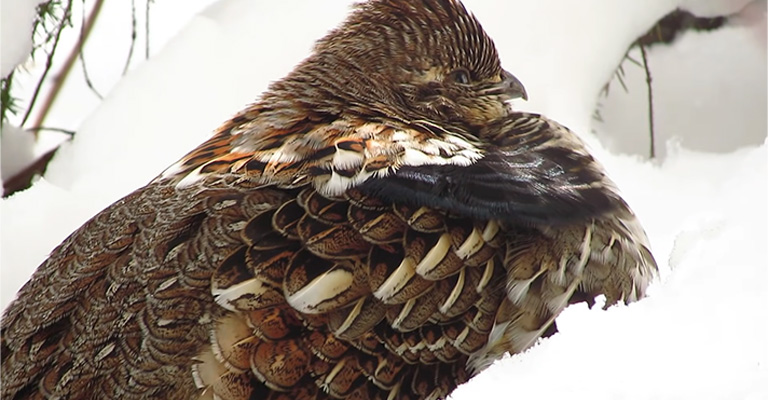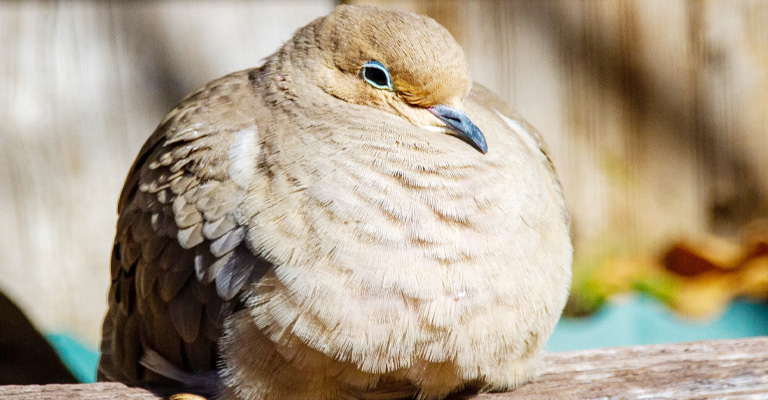Are you a free bird enthusiast? Then this article is just for you.
Birds have often been our point of interest. The colorful feathers and small tweets help us start our coffee fresh! Day ends and their sweet voice comes to an end.
Today, we’ll ask you a question that may not have crossed your mind until we brought it up. Do birds sleep with their eyes open? Have you ever seen their eyelids come off when they sleep?
Stay till the end of our article and you will learn things that you haven’t explored yet. Let’s begin.
All About Sleep:
- Birds often exhibit strange sleeping behavior, called Slow-Wave Sleep (USWS). Only one part of their brain sleeps at a time, while the other remains awake. They can rest and stay conscious simultaneously.
- Some birds (such as the swift) can microsleep during long flights. It’s like an airplane in auto-flight mode. Birds close one eye at a time, and rest during long migratory flights.
- Hummingbirds show a unique sleeping pattern. They enter a state of torpor. Here, their metabolic rate drops significantly, and body temperature decreases.
- Many birds, such as ducks and geese, sleep in groups on the water. This community sleep offers safety, as some birds in the group stay alert while others sleep.
- Moonlight can often affect the birds’ sleeping patterns. They may sleep during the darkest hours of the night to prevent potential predators.
- Some birds engage in courtship and rituals of mating while sleeping. For example, some male frigatebirds perform courtship during sleep to attract females.

Do Birds Sleep with Their Eyes Open?
Birds, like any other creatures, need sleep to rest and maintain an overall healthy body.
I have two cockatiels and one love bird, and I have never seen them sleeping with eyes wide open. So, do their eyes remain shut while sleeping? The answer is NO, but also not entirely YES. A bit dizzy? Don’t be.
Birds don’t sleep with their eyes open. But they most often sleep with one eye open. One eye remains entirely closed and asleep, while the other is completely awake and wide open. Creepy? Not really.
Members of the animal kingdom show off bizarre and strange sleeping behaviors. For example, horses sleep while standing. Many marine mammals like Dolphins or Seals also sleep like birds – one open, one eye closed.
It’s an instinct to be safe from predators and fly away in a moment of emergency at once! Having said that, no other creature is in 100% control of this flex. Only birds control it perfectly!
How Do Birds Sleep With One Eye Open?

Birds can sleep with one eye open thanks to Unihemispheric Slow-Wave Sleep (USWS). You had an early peek at USWS at the beginning of our article. Here’s the explanation for you.
What Is USWS?
We! The Human sleeps with both eyes closed. But birds are completely different. And why shouldn’t they be?
The USWS is a unique sleeping pattern. Along with birds, some mammals (as mentioned) also developed this unique trait. This is different from how most other living beings sleep.
For example, we can’t practice unihemispheric sleeping style. We can at most have trouble sleeping in a different place which is called the first-night effect.
Birds with USWS have sleep induced at only one hemisphere of their brain. The other hemisphere remains awake and active. One hemisphere experiences slow-wave sleep. It is the deep and restorative phase of sleep.
It’s interesting how the hemisphere that is asleep responds to the opposite side of the body. It is where the other eye is closed.
For example, if you notice the left eye close, it means that the right hemisphere is in deep sleep. The unique sleep behavior ensures sleep and awareness at the same time.
It’s important to note that birds are always in charge of which eye is open and which half of the brain is asleep. They switch periodically, so both halves of their brain get some rest. This way, they can stay on guard and well-rested at the same time.
Why Do Birds Sleep One Eye Open?

Life in the wild is not as smooth as our life. Most birds are not predators. Instead, they are often hunted down by other predators like snakes, owls, cats, and other animals.
In short, to improve their chance of survival birds have adapted to different survival methods and USWS is one of them. Other reasons are,
1) Aware of the Environment:
Birds are at one with nature. They live in ever-changing environments where weather conditions, like sudden noises, or storms are common. With one eye open, they can respond to sudden weather changes and take steps accordingly.
2) No Surprise Attack:
In the wild, birds can’t afford to let their guard down, even when they rest. They have to be alert, at least on some level. This way, they can prevent getting sudden attacks from predators and other birds as well.
3) Reserve Energy:
Birds need to conserve energy, especially during migration or while looking for food. The USWS consumes less energy compared to being fully awake. They can fly or carry on other duties like this without an error.
4) Proper Rest & Safety:
Like any other animal, sleep is essential for birds to recharge and recover, but it shouldn’t come at a cost.
Birds can stay safe from harm and also take proper rest with this sleeping pattern. It’s a proper balance between energy-saving mode and being on high alert.
Highlights of Today!
Birds don’t sleep with both of their eyes open. Instead, they sleep with only one eye open. This is also due to keep them safe and promote their survival rate.
Unlike birds, some other marine mammals also exhibit the USWS. However, they can’t entirely control this trait. But birds can!
Do you like our article? What do you think of this interesting sleeping behavior of birds? Have you heard of it before? Let us know in the comment section.
Also, don’t forget to share our article with others and help us grow too!